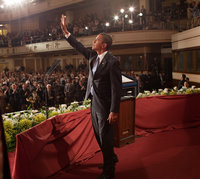In his comprehensively titled tome, "Diplomacy," legendary U.S. statesman Henry Kissinger laid out the two competing schools of thought that have guided American foreign policy in its rise to power. The first was realist, embodied by Theodore Roosevelt, based on power and obsessed with the zero-sum game that guides the core of international relations.
The second, touted by Woodrow Wilson, was idealist, based on cooperation and unflinching in its belief in the power of ideas. To Kissinger's consternation, though he believed that realism was the right way through which to view the world, he says that it was actually Wilson's liberalism that guided the country to its place as an unmatched superpower.
President Barack Obama took to the podium in Egypt yesterday following exactly Wilson's tradition. Talking to the invited audience at Cairo University, he offered no strict policy proposals. No new aid packages. No new American wars in the making. Instead, Obama spent nearly an hour espousing the American ideal, punctuating his speech with citations from the Quran. (The references elicited most of the sparse applause he received.) The obvious question is, Will it work?

